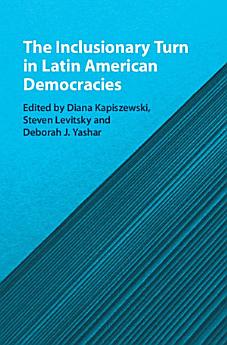The Inclusionary Turn in Latin American Democracies
About this ebook
About the author
Diana Kapiszewski is Provost's Distinguished Associate Professor of Government at Georgetown University. She studies legal institutions in comparative perspective, and field and qualitative methods, and has authored, co-authored, or co-edited five books and multiple articles on these topics. Her first book won the APSA Law and Courts Section's C. Herman Pritchett Award.
Steven Levitsky is Professor of Government at Harvard University. He studies democratization and authoritarianism, political parties, and weak and informal institutions. He is currently writing a book on the durability of revolutionary regimes. Levitsky is co-author (with Daniel Ziblatt) of How Democracies Die (2018), a New York Times bestseller published in twenty-two languages.
Deborah J. Yashar is Professor of Politics and International Affairs at Princeton University and editor of World Politics. She studies democracy and authoritarianism, citizenship, ethnic politics, violence, and immigration. Her last book, Homicidal Ecologies: Illicit Economies and Complicit States in Latin America (Cambridge, 2018), received the 2019 best book prize from APSA's Comparative Democratization section.






